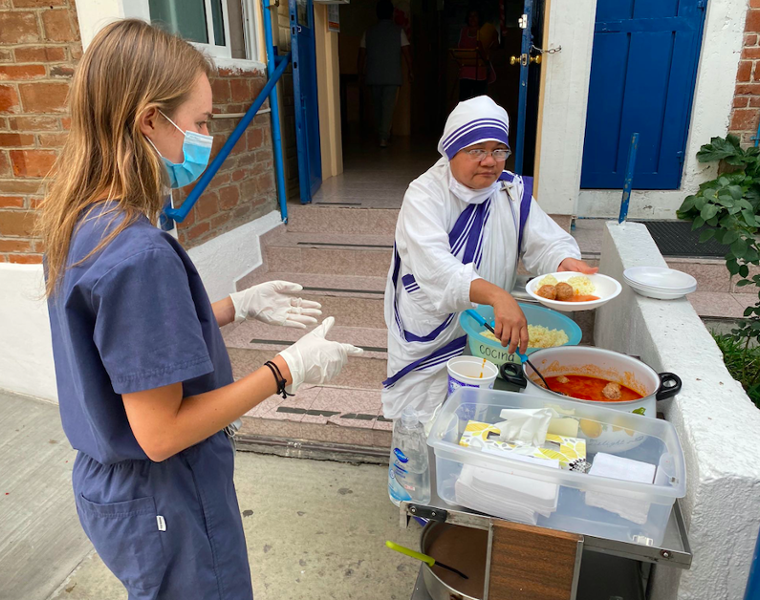Jessica Boyce ’20 graduated from TCU with a biology major and minors in Spanish and anthropology. Boyce is from Charlotte, North Carolina, and came to TCU on the pre-health track. In high school, she enjoyed science classes and always knew that she wanted to go into the medical field. Boyce took many interesting classes at TCU, including some related to infectious diseases. After graduating last year, she used her EMT license to volunteer with an organization in Mexico during her gap year before entering physician’s assistant school this May.

During her time at TCU, Boyce participated in Global Medical Training, an organization that provides basic health education and services to communities in Central American countries. She went on several trips with the organization, where she worked alongside local medical workers and translators to equip people with basic health education. Boyce traveled to the Dominican Republic three times, where she assisted doctors in rural communities.
As a student, Boyce was a member of the Physician Assistant club, Gamma Phi Beta, and Alpha Epsilon Delta. She was also a pre-health student ambassador, and she met with incoming students who were interested in the pre-health track. “In addition to her volunteer work post-grad, she also had an internship as a TCU student down in Mexico City working with a non-profit doing HIV outreach.” Matt Chumchal, professor and director of the Pre-Health Professions Institute, said. “I’ve been very impressed with Jessica’s commitment to public health.”
Post-graduation, Boyce has learned to be flexible and find ways to help in the midst of the pandemic. A few weeks after she graduated, Boyce got a call from COVID Care Force, an organization of volunteer healthcare professionals who help with critical healthcare needs that have arisen due to COVID-19. Through this opportunity, Boyce traveled to Tijuana, Mexico, where she worked as an EMT volunteer and lived with the Sisters of the Missionaries of Charity for a month.
The effects of the COVID-19 outbreak began to impact Mexico when Boyce arrived, and many of the local hospitals were closed as a result. The convent she worked with served homeless men in the area, and she could see how the need for meals and housing greatly increased due to the pandemic. Boyce got to travel to Mexico City one weekend, where she helped educate people there about how to best serve and safely provide for local communities in light of COVID-19.
“The thing that will stick with me going forward was seeing the transformative power of quality care,” Boyce said. “It’s so easy to see so much need and get caught up in the numbers. The sisters showed me that remembering the individual in healthcare is so important. They took the time with every person who walks in the door, and showed them care and love regardless of their background or life choices.”
Boyce returned home in July, and began working as the team lead for contact tracing in Forsyth County, North Carolina. In this role, she provides quarantine guidance, as well as any necessary resources to people affected by COVID-19. Boyce also volunteers at a free clinic twice a week, where she helps triage patients and serves as an interpreter. “It’s been a really neat way to meet people in my community,” Boyce said. “I like to travel and serve people abroad, but I know people with needs exist here too. It’s been a great way to get involved in my own hometown.”
This summer, Boyce will begin physician’s assistant school at the Medical University of South Carolina. While Boyce is not sure exactly where her career will lead her, she has a heart for working in underserved communities. “I want to help increase healthcare access to everyone,” she said. “Where that takes place or in what capacity it takes place, I have no idea. But I’m lucky that healthcare is needed everywhere.”
Boyce spoke to the power of contributing what she can to helping others. “One by one, healthcare workers are changing the world,” she said. “In Mexico, we saw a lot of people that society has written off, so I learned a lot about dignifying people. Instead of judging their past, it’s important to connect with patients, and sometimes even learn from them.”
Reflecting on her time at TCU, Boyce said she had opportunities at college that she will never forget. She mentioned both science and honors courses that stood out, as well as study abroad experiences. She credited TCU with providing a solid education to build her career upon. “I had many professors that encouraged me to take classes that interested me,” Boyce said. “This really pushed me in a direction that I didn’t expect. TCU definitely molded me to be a well-rounded student and helped me expand my global perspective.”